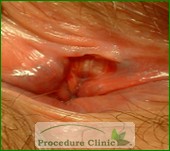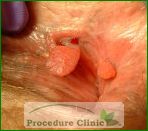 When you pass stool that is too hard or too large, a small tear may occur in the lining of the anal canal, known as an anal fissure. This could bleed and be very painful, but most of these heal without surgery. Anal fissures that fail to heal may become long term and cause significant irritation. The patients with chronic anal fissure may have discomfort, rectal pain, rectal bleeding with the bowel movement.
When you pass stool that is too hard or too large, a small tear may occur in the lining of the anal canal, known as an anal fissure. This could bleed and be very painful, but most of these heal without surgery. Anal fissures that fail to heal may become long term and cause significant irritation. The patients with chronic anal fissure may have discomfort, rectal pain, rectal bleeding with the bowel movement.

Acute anal fissures are fairly common and usually heal without treatment or with nonsurgical treatments. They may go away within two weeks. But if the tear doesn’t heal within six to eight weeks, you may need Botox injection or surgery for chronic anal fissure.
Nonsurgical treatments
A rectal cream containing hydrocortisone and the compounding medication Nifedipine gel may help it heal and reduce the discomfort. Botox injection into the internal anal sphincter has 90% effective rate by paralyzing the muscle for up to three months, but the insurance doesn’t cover for the Botox injection.
Surgery
If you have a chronic anal fissure that won’t heal on its own, surgery will most likely be the next option. The surgery, called partial anal sphincterotomy, may involve cutting a segment of the anal sphincter muscle to reduce spasm and promote healing, and may also include removing the fissure and any scar tissue resulting from it. Although rare, cutting the anal sphincter may lead to loss of ability to control bowel movements.
 To help stop irritation and recurrences, as well as promote healing, you should increase fiber intake, drink enough fluids, exercise regularly, take baths, and avoid straining during bowel movements.
To help stop irritation and recurrences, as well as promote healing, you should increase fiber intake, drink enough fluids, exercise regularly, take baths, and avoid straining during bowel movements.



